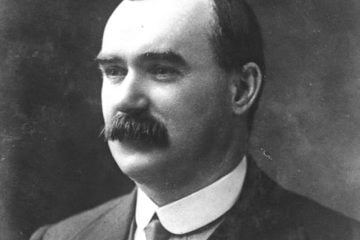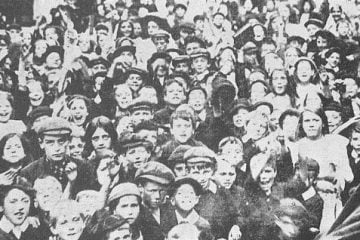On April 22nd 1870, Vladimir Ilyich Ulyanov was born. Born in Ulyanovks (then called Simbirsk, he would go on to become Lenin, a guiding figure of the Russian Revolution and Communist International! His father was a schoolmaster and his mother was the daughter of a doctor. His brother, part of the Narodovoltze, was executed for being involved in the unsuccessful assisnation of Tsar Alexander III.
As a young man, he went to study Law in Kazan. He was banished to the countryside in 1887 for taking part in a gathering of students. In 1889, he returned to Kazan and entered the local Marxist circle, beginning to read Marxist theory. This theory made such an impression on Lenin that he would later say ‘without revolutionary theory there can be no revolutionary movement’.
In 1895, Lenin went abroad to meet Plekhanov, Zasulich, Axelrod and the ‘Deliverance of Labour’ , a Marxist group. Upon returning, he began the ‘Union for the Liberation of the Working Class’, which became an increasingly important organisation. He married N.K. Krupskaya, a comrade who would remain his wife and companion for the rest of his life.
At the end of 1900, Lenin was involved in the founding of Iskra ‘The Spark’, along with Plekhanov. This was the official organ of the Russian Social Democratic Labour Party (RSDLP). In 1902, he moved to London to work on the publication, and met Trotsky this year. Trotksy travelled to London this year to meet Lenin, and they spent time walking through the streets of London discussing Marxist theory.
Lenin had also written his seminal work, ‘What is to be done?’, in this period. However, a split was being prepared in the editorial board of Iskra. Lenin’s decisive organisational methods were being questioned by Martov and others on the Editorial Board. Lenin attempted reconciliation but the political divisions between the factions would be later shown to be much deeper than either side thought at this point.
In 1905, Lenin returned to Russia from London to involve himself in the growing 1905 revolution. Upon his return, he realised that he had to work to correct the mistakes that the Bolsheviks had been making. They seemed to have become paralysed by the RSDLP split and the imprisoning of many of the leadership. They became stuck on internal discussions and debates with limited open work. They launched a weekly paper, ‘Proletarii’.
After Bloody Sunday, the mood was even more radicalised. Lenin was determined to pick up on this mood, but the ammeturness of the Bolsheviks meant this was an impossible task. Strikes took the country by storm, leading to the Tsar issuing three new constitutions. The third took the newly emerging Russian bourgeoisie to the side of Tsarism, proving the Permanent Revolution.
As the St Petersburg Soviet was founded, Lenin pushed the Bolsheviks to get involved, but they were still struggling with routinism. This was proven in the Moscow uprising, where the local Bolsheviks hesitated.
Eventually the 1905 revolution was defeated and Lenin knew that to have a successful revolution he needed to prepare a party ready to take leadership.
The next period was marred by years of reaction, often brutal and murderous. The social democratic organisations were being gradually pulverised. Many activists were arrested or killed. Others had to go underground, change town, or flee abroad.
Lenin threw himself into training the Bolsheviks and explaining that they must get in touch with the most radical and revolutionary layers of the working class in whatever way necessary. Lenin took a completely open approach and threw the Bolsheviks into the Dumas (Russian parliament).
In 1905, this would not have been a sensible approach, but by 1908 there was a need to prove the impotence of this parliament. This could be done by participating and placing demands on the Duma itself.
In this period Lenin also waged an ideological battle within the forces of Marxism. Many, demoralised by the years of reaction, were looking for ‘new’ ideas. Lenin took pen to paper to write Materialism and Empirio Criticism, showing the incorrect nature of these ideas and the primacy of dialectical materialism.
In the international context, he was hearing from Rosa Luxemburg about the damaged situation in the Germany SPD. When the war came in 1914, every section, bar 3, of the 2nd international voted in favour of the war, and to defend their own bourgeoisie.
Of course, the Bolsheviks held strong and did not defend the war in any way. This showed Lenin that the second international was politically morubund.
In January 1917, Lenin remarked that there was an organisation to build but a revolution would not happen in his lifetime. Of course, this was proven false within a month. Whilst the February Revolution overturned Russian politics, Lenin was in Zurich. He was keeping a close eye on what the situation in Russia was and as soon as he began to see the mood develop, he wrote to Stalin and Kamenev, who were wavering, ‘No trust in the provisional government! No trust in Kerensky’. However, he knew he could not leave it there. He returned to Russia on April 3rd to lead the Bolsheviks.
Once Lenin returned, he wrote the April Thesis and called for the Bolsheviks to lead the Russian Revolution. It was at this time that Lenin and Trotsky came together, with Lenin clearly backing the theory of the permanent revolution, and Trotsky admitting that his line on party building and revolutionary leadership had been wrong. In these months, they united politically and organisationally to become a powerful leadership.
In April, a situation of dual power emerged, this meant that the Soviets shared power with the Provisional Government. Lenin understood that this could not last forever and after the brutal repression by Kerensky in the July days, he called openly for an end to dual power and the dominance of the Soviets.
Lenin spent much of this year writing, in order to clarify important questions. He wrote both Imperialism: The highest stage of capitalism and The State and Revolution during 1917. These were both vitally important questions to understand how the Russian Revolution must develop.
Lenin’s actions in the run up to October meant that the Bolsheviks could take power alone. A socialist revolution had been successful. Lenin knew the hard part was now to come.
As soon as the Bolsheviks took power, many necessary reforms were passed. These were especially prevalent for women, who were given 12 months maternity leave, the right to divorce and much more. Homosexuality was also legalised and taken out of the view of the state.
However, Lenin was not given an easy ride by the international bourgeoisie. Suddenly, all eyes were on Russia. Lenin and Trotsky first struggled with the Brest-Litovsk treaty. The new Russian leadership was held at gunpoint by the world bourgeoisie.
Lenin spent his time politically fighting the counter revolution and trying to export the revolution. In 1919, the Communist International was founded. Lenin and Trotsky were the leading figures and politically dominated. They spent a great deal of time trying to raise the level of the whole international. This was seen in 1921 when Lenin wrote Left Wing Communism: An Infantile Disorder for the British CP.
Lenin understood how important an international revolution would be, and even said he would lose the gains of the Russian Revolution if it meant a successful German Revolution. However, the other sections of the Comintern were not ready to lead.
On January 21st, 1924, Lenin passed away. Leaving the memory of real Marxism up to Trotsky to defend. Although his death was untimely, and a great figure was lost, his ideas live on.
Lenin lived, Lenin lives, Lenin is to live forever!




0 Comments